When did you last need to interact with a human to buy groceries, get cash, or purchase fast food?
Machines allowing us to get services without dealing with real people are not new. From ATMs to self-service ordering at fast food restaurants, being able to simply and conveniently order a burger or retrieve cash when needed is a big win for businesses and customers.
The self-service kiosk market is a huge industry that is estimated to surpass $35.8 Billion in value by 2026.
These kiosks reduce staff workload by taking care of simple customer interactions so that staff can dedicate more of their time to execution, like making a hamburger if in the food industry, or cleaning a room and managing guest experiences in hospitality, rather than spending the majority of their shift ringing through orders or performing manual bookings.
Self-service kiosks can also reduce the need to have staff present at all times, like on holidays, weekends, or after hours. Instead, customers can get information and retrieve an object (like keys or a shipment) whenever is convenient for them. Implementing a self-service kiosk streamlines your business operations and reduces costs while at the same time increasing convenience.
This means that business owners, especially those who manage multiple properties, can do more with fewer resources without sacrificing customer service.
In this article, we explore more about self-service kiosks and their role in the hospitality industry.
What Are Self-Service Kiosks?
As the name implies, a self-service kiosk is a stand-alone computer terminal that allows customers or guests to serve themselves without the need for a staff member to be present. Usually, the kiosk has a touch screen with an easy-to-navigate interface that anyone can understand, meaning that the majority of customers can simply walk up and use it without any assistance.
The overall thought process behind a self-service kiosk is reduced pressure for frontline staff while simultaneously being able to move through more customers faster. Depending on the industry and the nature of the kiosk, one employee can manage several kiosks at once, or customers can access the kiosks without an employee needing to be present. As a result, customers can get what they want faster as wait times for the initial ordering process are essentially eliminated.
Types of Self-Service Kiosks
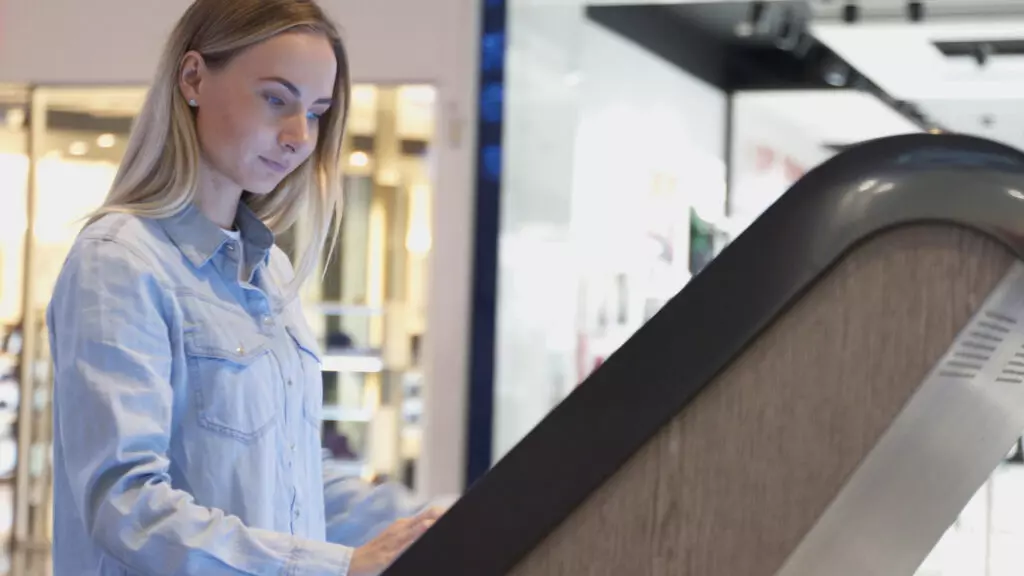
Many different industries and businesses have implemented self-service kiosks in various ways to serve people better and more efficiently:
| Industry | How They Use Self-Service Kiosks |
|---|---|
| Hospitality | Easy check-in/outWalk-in bookingsUpselling (e.g., offering additional services upon check-in) |
| Healthcare | Scheduling or rescheduling an appointmentPatient check-in upon arrivalEnsuring patient contact details are up-to-date (typically asked during the check-in process)Request prescription refills at a pharmacyMake payments for services such as deductibles or outstanding balances |
| Retail | Searching for products (e.g., a customer at a bookstore could use a self-service kiosk to find the location of a book, similar to a library)Self-checkout for purchasing productsRegistering for customer loyalty programsDirections (in malls) |
| Fast-food Restaurants | Dynamic menu (changes based on availability of product)Ordering and paymentFood customization |
For the purposes of this article, we’re focusing specifically on the hospitality self-service kiosk for our example use cases of this technology.
Hospitality Self-Service Kiosks: Benefits and Disadvantages
In the hospitality industry, customer service is paramount. An accommodations business goes to great lengths to ensure that their guests are getting the best possible service and experience at their facilities. The hospitality self-service kiosk is a key part of being able to provide exceptional service, but it must be implemented properly.
Let’s take a closer look at the benefits and drawbacks of self-service kiosks.
Benefits of Self-Service Kiosks
The benefits of self-service kiosks for the hospitality industry are quite numerous when you break them down:
1. Provides an Enhanced Customer Experience
Instead of having to wait behind a line-up of people to check in or out, guests can do it themselves via a self-service kiosk. It also allows accommodation providers to allow guests to check in or out even when no employee is present, like during holidays or after hours. This means that a consistent, positive customer service experience can be provided to guests through seamless check-in/out, payment, and more at all times.
Plus, it’s easy to add upsell options during the check-in process that help enhance the guest’s experience.
2. Saves Money and Increases Efficiency of Service
A hospitality self-service kiosk helps accommodation operators save money by optimizing resource allocation without sacrificing customer service. They minimize the need for additional staff while at the same time reducing workload for existing employees.
For example, imagine a large group of guests arriving at one time, like from a tour group or students on an overnight school trip. Chances are that these larger groups of guests will occupy your front desk employee’s time as they work to check everyone in, coordinate rooms and keys, give directions and instructions, and call other staff members to help with luggage and other needs that the group may have. This means that anyone else who enters the building and wants to check in might be waiting quite a while before they are able to be served. Savvier employees might opt to check in the occasional guest or couple that comes in so that they don’t have to wait, which means the larger group occupies more of their time.
Now imagine this scenario with a self-service kiosk available. While your employees deal with the group, single guests, couples, or even families can simply check themselves in using the self-service kiosk and proceed straight to their rooms without having to wait. This provides a more streamlined and effective customer experience and reduces pressure on frontline staff to multi-task and pivot from one customer to another, which can result in mistakes and stress.
3. Provides More Upselling Opportunities
For many accommodation providers, upsells are their bread and butter. If you can attach an extra service to each guest’s stay, that’s a huge win for revenue. You might think that if an employee isn’t there to convince a guest to take an upsell opportunity, that upsell would go down.
But with a self-service hospitality kiosk like the one offered through Newbook, the appropriate upsells and promotions can be offered to each customer who uses it, seamlessly incorporated into the check-in or booking process.
For example, let’s say a guest arrives at your lakeside resort late in the evening to check-in, and there is minimal staff on site as a result. The guest can use the self-service kiosk to check in and rent a kayak for the next day. The kiosk can handle this process seamlessly without the need for employee intervention.
4. Increased Safety
The lack of human interaction that a self-service kiosk encourages might be seen as a disadvantage in some situations (which we’ll get to soon), but sometimes reducing contact with each other is a good thing. An obvious example is the recent COVID-19 pandemic. Even with a serious illness going around, people still need places to stay for a wide variety of reasons. As an essential industry, hospitality businesses needed to find a solution that allowed them to continue to serve their customers and prioritize their employees’ health and safety. Online booking is one solution, but it doesn’t address customers who walk in looking for a place to stay or the needs of guests currently staying at the hotel. To add another layer of complexity, various municipalities used many hotels to house individuals with COVID-19 and healthcare workers exposed to the virus.
Self-service kiosks proved to be a solution. Easy to implement, quick to get up and running, and straightforward for guests to use, the kiosk solved the problem of close human interaction by allowing guests to check in and out, order room service or cleaning, and complete other actions without needing to interact directly with another person.
Since the first round of COVID-19, the benefits of self-service kiosks were so obvious that accommodations businesses that were using them at the time kept them. A survey of 525 hotels around the world found that during the pandemic, the use of self-service kiosks increased by 66%.
5. Easier to Deploy Compared to Mobile Check-in
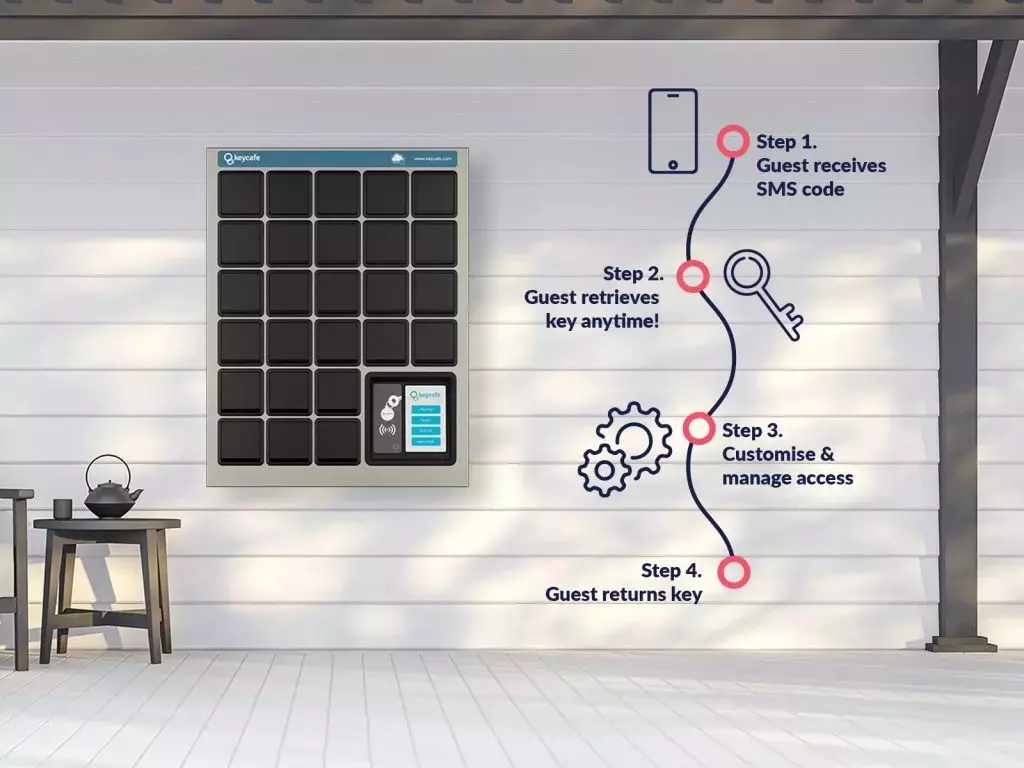
With applications being able to perform any task remotely, you might wonder why you wouldn’t just go with mobile check-in for your accommodations business. While it’s a viable option, mobile keys require a heavier investment in electronic locks than kiosks. Specialized locks must be installed on each unit and checked to ensure they work properly. While most modern smartphones have Near-Field Communication (NFC) built into the phone by default, not every smartphone does, and not every customer may understand how to use the technology. Further, there is the chance that the customer’s device may not work properly with the electronic lock, tarnishing their experience and requiring them to gain access to their room via a physical keycard, FOB, or actual key anyway.
Newbook’s self-service kiosk combined with the Key Café can optimize the check-in process by providing contactless check-in with the ability for the guest to retrieve a FOB, keycard, or physical key. First, the guest checks in via the kiosk and receives a special code to retrieve their key from a locked box. When their stay is complete, guests can easily return the key to the box!
Say hello to your 24/7 reception with Newbook’s self service kiosks
Newbook is your all in one property management system. Talk to us today to learn how you can improve operations and increase bookings for your business.
Disadvantages of Self-Service Kiosks
While self-service kiosks are a great way to diversify the way your accommodation business deals with guests, the technology does have its drawbacks that you need to be aware of to be able to take full advantage of its offers.
Here are some drawbacks to keep in mind when implementing a hospitality self-service kiosk:
1. Lack of Human Interaction
Although there are specific situations where not having a physical human to interact with customers can be beneficial, making too much of your hospitality business reliant on machines might dampen the guest experience rather than enhance it.
Aside from the fact that some guests might just feel turned off from never interacting with a human while they are staying at a vacation rental or hotel, there are some services that a machine simply can’t provide (at least not yet):
- Helping guests with carrying their luggage to their room
- Valet services
- Offering a friendly greeting upon arrival (it’s strange to hear it from a machine)
At the end of the day, kiosks should not replace people. The focus of a self-service kiosk should be to complement your business’s approach to customer service without replacing the human side of things. In a way that machines can’t, your employees can answer questions, help solve any problems, and provide a personalized customer service experience. The main focus of a self-service kiosk should be to make employee’s jobs easier rather than focus on replacing them.
2. Accessibility Issues
Although there are various accessibility guidelines that businesses can follow for website and application UI/UX design, a self-service kiosk might still be difficult for some individuals with hearing, sight, and mobility issues to use. In these cases, self-service kiosks become more of a hindrance than a convenience.
To ensure that the self-service kiosk can provide a positive experience for as many guests as possible, it’s important to ensure that they have certain accessibility features. While some types of self-service kiosks, like ATMs and fare machines (that sell tickets) have regulations for hardware and software design, there aren’t any regulations for the newer self-service kiosks used in public accommodations and commercial facilities.
There are a variety of considerations to keep in mind to ensure that your kiosk is accessible. Some key considerations include:
- Keeping in mind all types of disabilities. With the wide range of disabilities out there, trying to ensure that you choose a solution that thinks about everyone can seem overwhelming. However, the city of Colorado Springs released accessibility documentation for kiosk developers that could be helpful for creating a checklist of features you should look for.
- Physical accommodations. Aside from the kiosk being a reasonable height for a wheelchair user to be able to reach it (similar rules are in place for elevator buttons, ATMs, etc.). It’s important to remember that some wheelchair users also have other physical impairments, so the kiosk controls should be accessible in a vertical and horizontal formation.
- Kiosks should have multiple input types. Usually, accessible kiosks will have more than one type of input option, typically speech and touch. The user should also be able to adjust the volume of audio as needed.
3. Job Loss
From the job seeker’s perspective, a self-service kiosk may be seen as a tool that reduces available jobs. While automation and artificial intelligence may seem like it’s taking over jobs, technology historically creates more jobs than it eliminates. Usually, the jobs that are created are more involved and higher-value, like guest services.
Advanced Kiosks Self-Service Solutions
When it comes to choosing an effective self-service hospitality kiosk solution, there are a few things that you should keep in mind:
- The software should be easy to use and reliable. You don’t want your employees spending more time helping guests use the kiosk or directing guests to the front desk because the kiosk isn’t working properly. The software should be straightforward enough that every guest can navigate it without issue and reliable enough that downtime is minimized as much as possible. A self-service kiosk isn’t much use to you or your guests if it’s broken down more than it’s up and running.
- It should have a clear revenue flow. Depending on what the guest wants to get done, the kiosk should provide a clear flow from A to B while at the same time considering upsell opportunities. For example, when someone checks in, the software should seamlessly take them from the check-in confirmation to offering applicable promotions and upsell opportunities without being disruptive to the main goal.
- It should offer payment options. A self-service kiosk should complete the guest's order, including allowing them to pay for their stay and any additional services they require. Newbook offers an integrated EFTPOS terminal (electronic funds transfer at point of sale) so guests can easily and safely complete their orders.
- It should solve a specific pain point that your accommodations business experiences. Whether dealing with late check-ins or reducing on-call staff costs, a self-service kiosk is more than just a fancy machine you place in the foyer, it’s a tool that should assist you with solving one or more business issues. Make sure you match the features and benefits of the self-service kiosk solution that you choose with your business goals and objectives.
With those considerations in mind, here are some examples of self-service hospitality kiosks on the market today:
1. Newbook
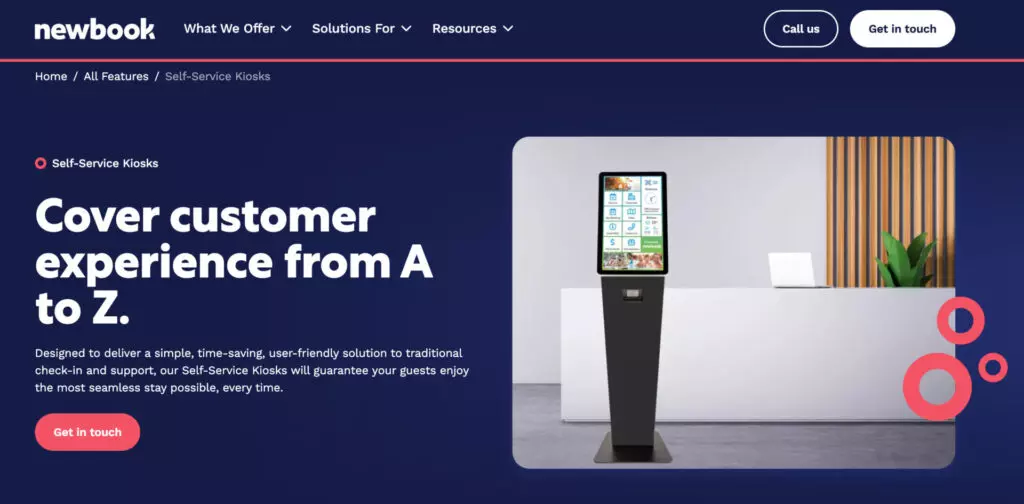
To support the modern accommodations business, Newbook offers simple, time-saving, and user-friendly self-service kiosks to enhance customer satisfaction and reduce workload for your frontline staff. The kiosk features a modern design and can be placed in any convenient location in your hotel, vacation rental facility, or apartment foyer for guests or tenants.
Specific features and benefits that Newbook’s self-service kiosk offers are outlined in the table below:
| Newbook Self-Service Kiosk Features | Benefits |
|---|---|
| - Check-in/outBookings management - Property information and FAQ area - Gift voucher purchase - Email or SMS receipts - Pay balances and rent - Complete agreements and surveys - Retrieve access codes - QR code scanner - Book facilities and appoints - Select a site (campgrounds) | - Reduce front desk wait times for customers - Reduce staffing costs - Provide a contactless check-in option - Reduce office hours - Boost your team's productivity and efficiency - Provide 24/7 customer service |
What makes Newbook stand out from most hospitality self-service kiosk options is the tie-in to being an all-in-one solution for your accommodations business. While most other kiosks are stand-alone units that don’t seamlessly work with your tech stack out of the box, Newbook is unique in that every piece of software and hardware is designed to work seamlessly as part of a complete solution.
The kiosk is one part of a complete solution that includes:
- Property management
- Channel management
- Online booking
- Centralized reservation system
- Integrations with other accommodations software
At the end of the day, when you choose Newbook, you’re getting technology that strengthens your workflows and processes from start to finish, giving you and your staff the ability to deliver a better customer experience.
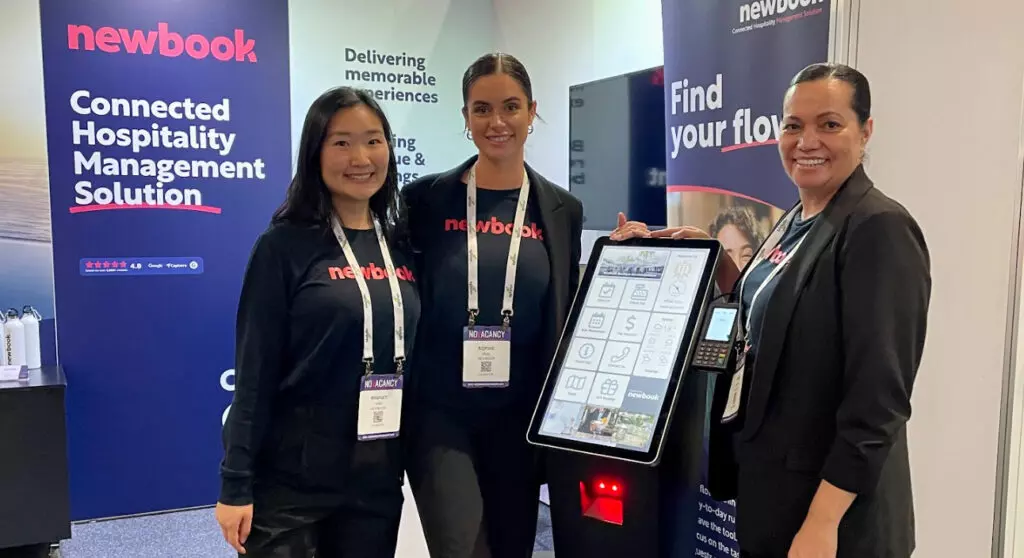
2. Meridian Hospitality Kiosks

Merdian is a company that makes a wide range of different types of kiosks for different purposes, such as ticket sales, interactive digital signage, and secure check-in and key dispensing. When it comes to hospitality self-service kiosk options, they provide a wide range of kiosk styles with varying screen sizes, colors, and heights to choose from.
Depending on the type and style of kiosk you choose, various options are available, such as:
- Wi-Fi or cellular connectivity
- Payment terminal
- Access door on the front of the unit
- Proximity sensor
- HD camera
- Barcode scanner
- Physical keyboard
- Printer options
- Tablet or PC
While Meridian offers lots of types of self-service kiosks, you can expect each one to be a stand-alone solution for your business. This means that integrating with your existing tech stack is going to take additional time and resources on your end to get up and running. If your goal is to gather insights from your self-service kiosks and compare them to the insights gleaned from other sources like online and point of sale, then that will need to be done manually by you as the kiosk is designed to be a stand-alone solution.
3. Roommatik
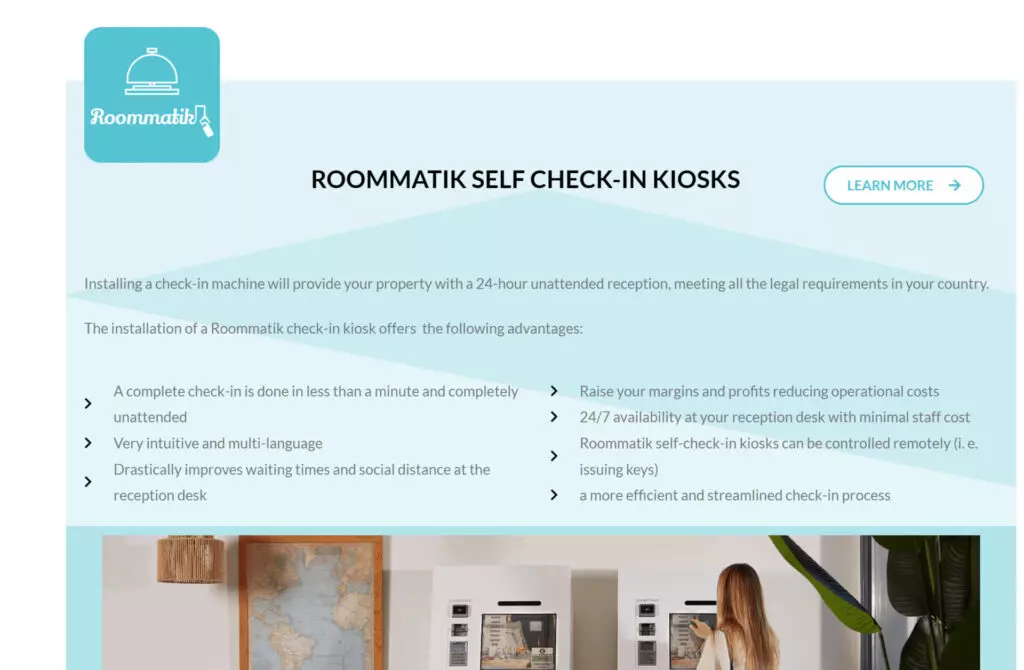
Another company that provides a well-rounded variety of self-service check-in kiosks is Roommatik. The kiosks can be customized to fit on the wall or a unit that fits on a counter or table. The wall-based units have the option of a physical keypad which can be used for a variety of applications, from guests notifying a tenant that they’ve arrived (“buzzing in” to an apartment building) to inputting payment information.
Like Meridian, however, the kiosk is sold as a stand-alone solution, and any integrations with software would have to be handled remotely by the purchaser.
Conclusion
The increased use of self-service kiosks in the hospitality industry signifies a shift in how businesses and customers interact. These innovative solutions have become indispensable tools for hotels, vacation rentals, and other accommodations, transforming customer experiences and optimizing operational efficiency.
The benefits of self-service kiosks are abundant. They enhance customer experiences by offering seamless and convenient check-in/check-out processes, even during non-office hours or busy periods. By reducing staff workload and streamlining operations, these kiosks enable businesses to allocate resources effectively, ensuring that employees can focus on providing personalized services and solving complex guest needs. Additionally, self-service kiosks open new avenues for upselling opportunities and maximizing revenue streams.
These kiosks have also played a crucial role in addressing safety concerns, particularly during the COVID-19 pandemic. By minimizing direct human interactions, they have provided a secure means for guests to access essential services while adhering to health protocols.
Choosing the right self-service kiosk solution is pivotal. Newbook's integrated approach stands out, offering user-friendly kiosks and a comprehensive suite of software tools tailored to accommodations businesses.
Get in touch with Newbook today and discover how our self-service kiosks can help streamline your business operations.
Say hello to your 24/7 reception with Newbook’s self service kiosks
Newbook is your all in one property management system. Talk to us today to learn how you can improve operations and increase bookings for your business.

